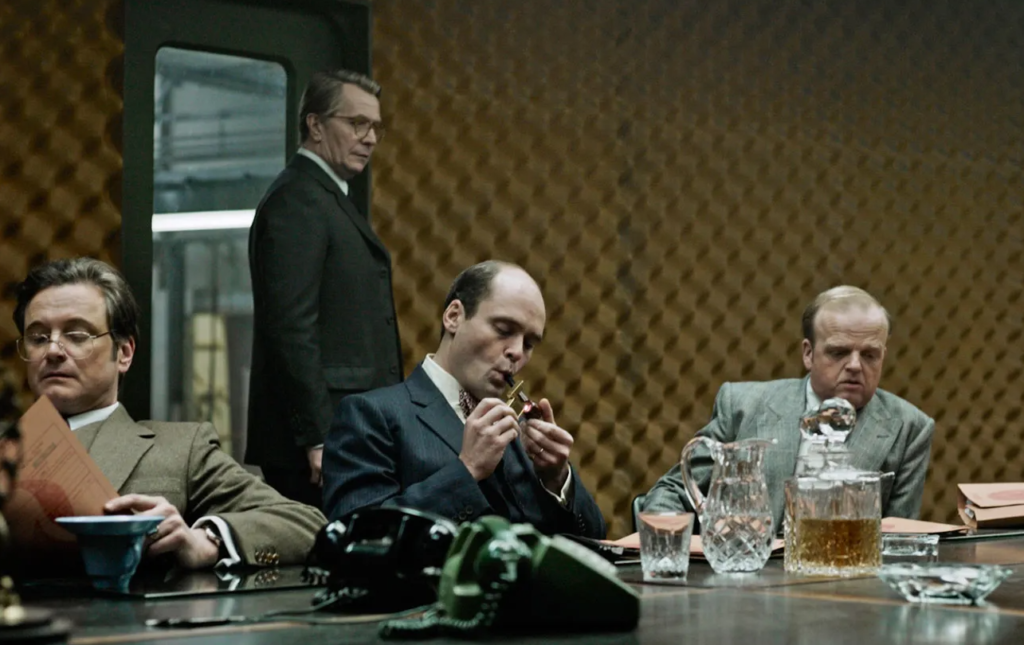
The procedural is my comfort food. I seek the calm of the solved mystery the way that some may watch Bake-Off or The Real Housewives of _place-name_. I’m not alone in this. Shows like NCIS (435 episodes as of this writing) have been on TV for forever and it takes all of five seconds on a channel like BritBox to find any possible combination of setting, main character, sidekick, and quirk:
-
- Pies, with a retired policeman solving crimes: Pie in the Sky
- Pies with a manic baker who can return dead things to life but he can’t touch them again. Sidekick: a childhood sweetheart but they can never touch directly or she’ll die again: Pushing Daisies
- Small-town police force with outsider at lead, but on a Scottish Isle: Shetland
- Small-town police force with outsider at lead, but in Caribbean: Death in Paradise
- Small-town police force with a Barnaby at lead, but in the English countryside: Midsomer Murders
- You get the idea, and if you need more examples, see the previous entries in this series. But the absolute comfort food stories for me are—and I’m talking the most uber lasagna comfort food that you can possibly imagine—spy stories in general, and George Smiley stories in particular. If one is used to thinking about James Bond and Jason Bourne as agents in the field, think of George Smiley as the figure back in the office, deploying these agents. Except in Smiley’s world, everything is tobacco-stained and the air smells like car exhaust and brandy, and somebody tracked slush through the halls when they signed in this morning.
- John Le Carré’s most famous character is a British spymaster whose career begins in World War II and ends with Soviet reforms like perestroika. Smiley mirrors Le Carre’s personal background in espionage. Indeed, Le Carré was one of the spies who was outed by actual double-agent Kim Philby. Smiley has a keen wit combined with a bureaucrat’s love of paperwork and research, and a profound (if hard-earned) understanding of the human condition, which goes a long way as he thinks of moves, countermoves, and motivations of his opponents.
Unremarkable Clothing, Pensive, Loves Poetry
Smiley is not a brawler like Maigret nor a dandy like Poirot. Like Miss Marple, he reveals as little as possible of what he knows and files away every stray comment made in his presence. When investigating the traitor within British intelligence, Smiley would even see the importance in choice of verb tense when speaking to someone (such as when he learns that the capture of Jim Prideaux was planned in advance due to an are when he was expecting a were).
He is generally described as nondescript in clothing and appearance, a slightly plump office-worker with utilitarian clothing. He married slightly above his station, to the often absent Ann, a beautiful woman whose string of affairs are common knowledge and the fodder for decades of rumors by everyone around Smiley. As portrayed by Alec Guinness and Gary Oldman, Smiley wears glasses and is always cleaning them on his tie or handkerchief.
What is most notable is his combination of quiet and cunning. His ability to let others talk and talk works to his advantage as mentioned above, but the character seems content to nod politely in conversation even when he isn’t piecing together some grand plot by Moscow Centre. Smiley’s job is not just to anticipate the moves of his enemies, but to anticipate how they will react if they assume that he knows of their moves. And if they countermove in that way, how should he respond? What if he feeds them false information about his intent? What if they learn real information but he is able to make it seem false? What if it is both false information and he convinces the Soviets that the information is false in the hopes that they will think it true? And on. And on. And on. His nemesis in Moscow, codenamed Karla, has a similar level of cunning, and it is incredible to see their duels of espionage play out on the screen: it is world-building from behind a desk.
This brings us to the best part of Le Carré’s works, the jargon.
They Paid for a Dead Letter Box Out of the Reptile Fund
Every procedural has its jargon, but Smiley’s world has layers of jargon due to the nature of espionage. Characters are always using coded messages and passwords when dealing with possible defectors, coworkers, snitches, or what have you, and the insular nature of espionage means that a shorthand develops. This way, one’s fellow agents get a shibboleth like Reptile Fund (essentially the discretionary spending / petty cash of British Intelligence) but the casual eavesdropper may not have a clue what you mean.
Le Carré helped usher many of these words into the mainstream. No English speaker in 2022 bats an eye at the word “mole” meaning a traitor, and the spies of Le Carré’s novels are the reason why. “Honey trap” (using sex to achieve an espionage goal) and “babysitter” (a spy who must watch an asset or other spy) are two others that are commonplace now due to these books.
But deeper than that are words/phrases like Moscow Centre, The Circus, lamplighters, scalphunter, the dead letter box, and many others. Smiley’s lengthy tenure in British spycraft has given him decades of experience in the tools and words of his trade.
Books
The books run a little longer than your garden-variety spy novel, but that’s because Smiley doesn’t get to blow up the secret base under the volcano by shooting a pressure valve with an explosive cufflink. There is a joy in the measured pace at which Smiley and his resolve their plans. Even when Smiley is in the background of the story, such as in The Honourable Schoolboy or The Spy Who Came in From the Cold, one still feels the rusty machinery of spycraft grinding along. For every scalphunter like Ricky Tarr who is doing the James Bond field agent schtick, there is a whole army of transcribers, translators, weirdos who dig through trash, photographers, and researchers (countless researchers) poring over tax records and traffic camera footage and newspapers and who knows what else.
Movies / Series
Tinker, Tailor, Soldier, Spy (2011) is one of my favorite movies of all time. The film is perfectly structured and not a second of runtime is wasted. The dense nature of the book and its structure mean that the film can be completely overwhelming to a new viewer, but repeated viewings are very rewarding. Knowing who the mole is doesn’t make Smiley’s hunt any less satisfying, and seeing how flashback x dovetails with interview y makes me appreciate the screenplay even more.
The 1979 adaptation for BBC is almost as good, although its 5-hour runtime makes it more of a treat and less of an impulse watch. Smiley’s People (1982) is not quite as good but looks quite sharp on blu ray. It amuses me to no end but Alec Guinness filmed two iconic Le Carré adaptations in between Star Wars (1977) and The Return of the Jedi (1983): I’ll take George Smiley over Obi-Wan Kenobi any day of the week and twice on Sunday.
The Spy Who Came in from the Cold (1965) is a famous spy film with Richard Burton in the lead, but I dislike the story and Smiley is but a small part of it.
There is an adaptation of A Murder of Quality in 1991 with Denholm Elliott as Smiley, a person who you’d recognize either as Marcus Brody from the Indiana Jones movies or the butler from Trading Places (1983).
If you like spycraft but prefer a less pessimistic lead character than George Smiley, I recommend the many other Le Carré adaptations out there. The Night Manager (2016) stars Tim Hiddleston and is on Amazon Prime. The Russia House (1990) is pretty great and has good performances from Michelle Pfeiffer and Sean Connery. The Tailor of Panama (2001) has one of my favorite Pierce Brosnan performances, as well as the legend Jamie Lee Curtis and Geoffrey Rush as the titular tailor (maybe ignore Brendon Gleeson’s turn as a latino). There are plenty of others across film and television stretching back to the 1960s; I didn’t care for The Constant Gardener (2005), but it was maybe just a bit too dour for my tastes.
Smiley Power Rankings
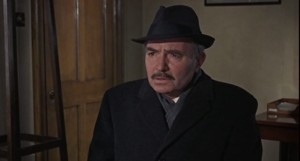
Not ranked: James Mason
The Deadly Affair (1967)
I’ve not yet seen this movie, so I can’t properly rank the performance. James Mason is an iconic actor though, with one of the most distinctive voices in cinema, so it does seem like a tall task that he’d disappear into the everyman frump of George Smiley. (Worth noting that the character isn’t even named George Smiley in this because the character’s film rights were bought by a different studio.)
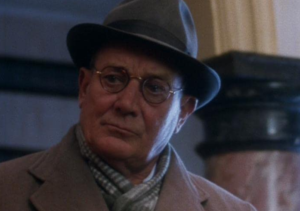
4. Denholm Elliott
A Murder of Quality (1991)
I enjoyed Elliott’s performance (the film is available in its entirety on YouTube and just about nowhere else, based on my searching), but he didn’t feel like George Smiley. Elliott’s innate warmth was omnipresent, and that combined with the general cozy mystery vibes to make this very tonally different than the rest of Le Carré’s adapted works.
Smiley is called out of retirement by an old colleague to investigate a murder at a boarding school. There, through a combination of studied senility and razor-sharp wit, he sorts out the crime and its perpetrators. He is aided in this by the local police, and I appreciated how quickly the police grokked Smiley’s competence and let him continue his private investigations.
Again, this story is not really a spy story, but it was fun to see how Le Carré would write a cozy mystery.
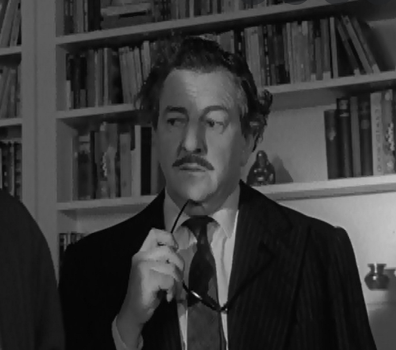
3. Rupert Davies
The Spy Who Came in from the Cold (1965)
Davies makes his second appearance in the Cozy Mystery Pub. He plays Smiley in The Spy Who Came in from the Cold, a story in which Smiley is a minor character. Davies is a delight on screen, but there is not much to work with here, and what is there is inferior to the rest. The film, if you are unfamiliar, is centered on a gamble: a spy is loudly and shamefully fired so that he can be picked up by the other side for use as a defector and agent. However, this is intentional and the ruse is a means to gain access to East Berlin intelligence operatives and eventually discredit a high-ranking agent by claiming that he is a double-agent for the British. Except that the guy is really a British double-agent and the goal was to poorly discredit him so that the Soviets will wholly trust him.
If that description confused but intrigued you, this might be the movie for you.
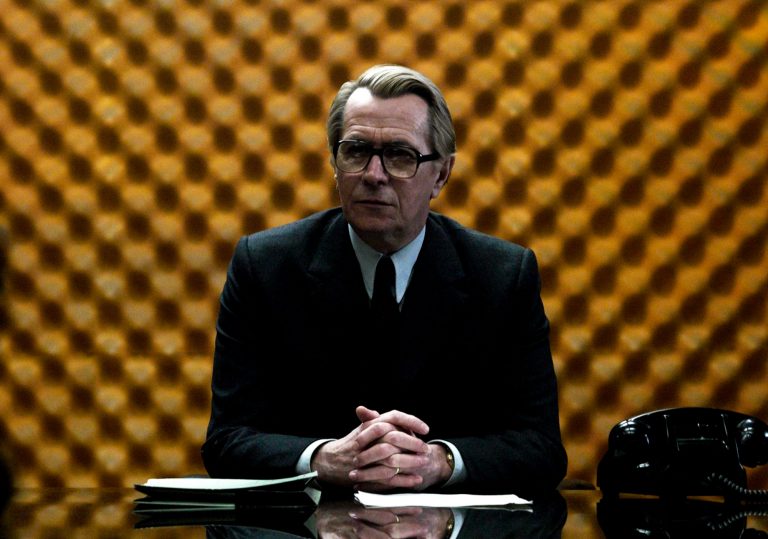
2. Gary Oldman
Tinker Tailor Soldier Spy (2011)
I confess to being lukewarm on Gary Oldman as an actor. I’ve enjoyed his gonzo performances in movies like Léon: The Professional (1994) and The Fifth Element (1997) and his understated work like in Rosencrantz and Guildenstern Are Dead (1990), but I mostly find him hacky and repetitive. So when I learned that he was playing the reserved George Smiley, I assumed it to be stunt casting. How would the guy known for this handle a character whose broadest expression of emotion is a slow blink of the eyes?
To say that Oldman disappeared into the role would be an understatement. He doesn’t speak until the meeting at Lacon’s house, which is about 25 minutes into the movie… despite being in essentially every scene up to that point. I grin in every viewing when he gives a slow nod of agreement to (John Hurt’s character) Control saying that he will also be quitting the Circus. His dressing-down of the Minister, once they realize what the mole had been doing, is one of two scenes where his voice is raised, and the incongruity of heated emotion and George Smiely is like seeing your dad cry for the first time.
I imagine that they padded Oldman’s suits to help him get the rounded profile of Smiley, and I can also say that after 20 viewings, I still have no idea if his hair is supposed to be grey or blonde or somewhere in between (I guess “tobacco-stain yellow” approaches the truth of it). But man, it is a great performance.
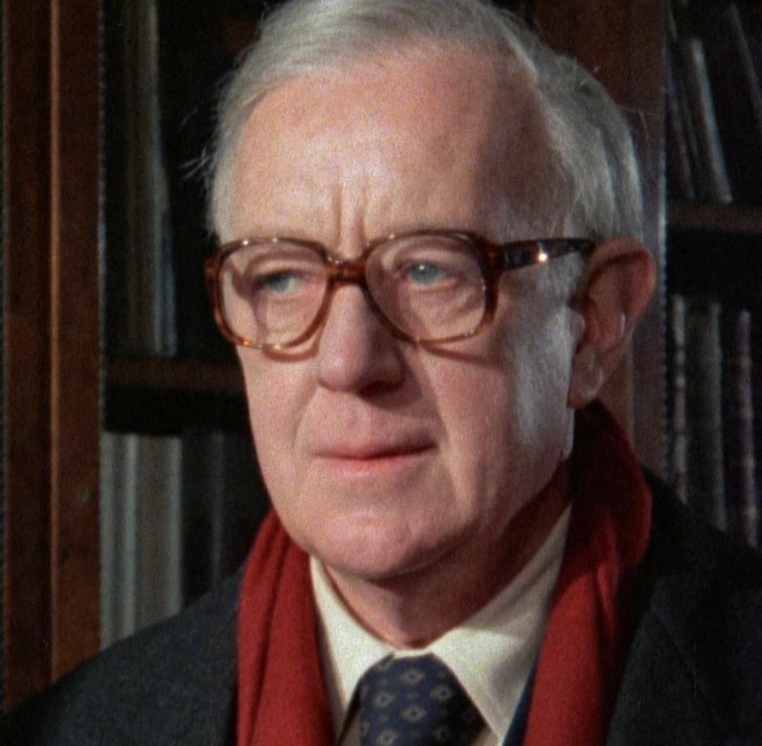
1. Alec Guinness
Tinker Tailor Soldier Spy (1979), Smiley’s People (1982)
This isn’t a surprise. Guinness gives the definitive performance of George Smiley in a damned excellent and highly regarded miniseries. His Smiley is so stonefaced that the slightest twitch of an eye or the faintest smile reveals much. And the performance is masterful as the narratives unfurl: watch him transition from quiet observer to leader through sheer presence. And I mean that literally, as Smiley goes from forced retirement to spearheading the mole-hunt within the span of a single conversation with Minister Lacon.
I’ll not rehash much of the plots of these stories, but I will say that Smiley’s People concludes the espionage battle between Smiley and Karla (Karla, by the way, played by PATRICK STEWART), so I’d probably forgo seeing it before you’ve seen TTSS.
The miniseries format allows these stories to really stretch out. Smiley’s forced dinner with an old schoolmate is excised from the 2011 film but the extended runtime of the miniseries allows for this excellent scene, which paints so much of Smiley’s personality: he suffers a fool as long as the fool holds some informational or materiél value, but not for a milliscecond beyond that point. Guinness’s Smiley also is more open with his pangs of embarrassment about his wife’s very public infidelities: Oldman’s Smiley seems to bury his head in the sand but Guinness shows vulnerability.
It should not be surprising to viewers that Guinnes is the best Smiley. Guinness was a legend for Kind Hearts and Coronets (1949) and The Lavender Hill Mob (1951) and The Bridge on the River Kwai (1957) and Lawrence of Arabia (1962), as well as a beloved character in the highest-grossing film of all time (Star something-or-other). There is a world where he would have seen a TV miniseries as beneath him despite its prestigious roots and its stellar cast. Thankfully, he took the job and the world of spy stories is all the better for it.